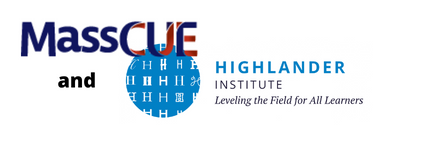
Description
In an average school year, teachers and administrators are inundated with data from diagnostics, assessments, and standardized tests. School stakeholders are expected to take action and measure success around these data packets, often feeling the urge to qualify these numbers with student stories. Join Highlander Institute and MassCUE as we explore strategies that prioritize and balance school data to paint a complete picture of a student’s experience. Through the Looking at Data with an Equity Lens Series, you will explore how using research-based culturally responsive practices can help analyze data by centering around students’ identities and culture for a fuller picture of how they are doing academically and socially emotionally in your school or classroom.
Using Highlander Institute’s Culturally Responsive & Sustaining Pedagogy Framework as a guide you will learn how to construct a measurement plan, create connections between various data points, and design interventions through the lens of instructional equity for students with stakeholders.
By the end of the series, you will leave with an understanding of how we as educators can play a role in disrupting inequities in our schools and classrooms by examining case studies, taking part in data protocols, exploring sample data sets from a student experience survey, and leveraging research-based culturally responsive practices. You will have a plan to measure what you value, and value what you measure.
You will complete this work alongside other educators in a cohort model as we meet virtually over the course of five 90 minute sessions. Participants will have access to all course resources, monthly virtual online meetings, and asynchronous support between sessions.
Registration Deadline: January 18, 2022
Course Details
| Audience | School Leaders, Instructional Coaches, Teacher Leaders |
| Level | K-12 |
| Instructors | Christina Corser and Karina Rodriguez |
| Dates |
Tuesday, January 25, 2022 Tuesday, February 8, 2022 Tuesday, March 8, 2022 Tuesday, March 22, 2022 Tuesday, April 5, 2022 |
| Time |
Live Virtual Meetings 4:00 P.M. – 5:30 P.M. |
| Earn | 10 PDPs |
| Location | Online |
| MassCUE Cost | $195 |
| Limit | 20 Participants |
| Graduate Credit (Optional) |
At the first class, participants may choose to register for 1 graduate credit through Worcester State University for an additional fee of $125. All participants, including those who do not opt for graduate credit, will receive a certificate documenting the number of course hours attended. |
Instructors
Christina Corser
 As a Partner, Christina works with administrators, teachers, and students to realize their visions of personalization. Christina believes that culturally responsive personalized learning is the lever for radical change in education and supporting student agency and equity. At the Institute, Christina develops and delivers high quality professional development, classroom modeling, and individual coaching sessions for teachers, school administrators, and district personnel as it relates to the Highlander Institute’s pedagogical framework and school change framework. She is also the creator of Highlander Institute’s Be Education podcast.
As a Partner, Christina works with administrators, teachers, and students to realize their visions of personalization. Christina believes that culturally responsive personalized learning is the lever for radical change in education and supporting student agency and equity. At the Institute, Christina develops and delivers high quality professional development, classroom modeling, and individual coaching sessions for teachers, school administrators, and district personnel as it relates to the Highlander Institute’s pedagogical framework and school change framework. She is also the creator of Highlander Institute’s Be Education podcast.
Before working at the Highlander Institute, Christina supported students and teachers as a behavioral and academic interventionist, taught 4th grade in an intentionally diverse charter school, and taught K-12 in a residential behavioral health facility in Honolulu, HI. Christina holds an undergraduate degree from the University of Rhode Island, and a Master’s in Teaching from Rhode Island College.
Karina Rodriguez
 As the Institute’s Senior Data Partner, Karina leads the charge to strengthen the organization’s impact and effectiveness through continuous improvement and data. Karina creates the data and analysis systems and protocols and translates learnings into iterative actions for the organization.
As the Institute’s Senior Data Partner, Karina leads the charge to strengthen the organization’s impact and effectiveness through continuous improvement and data. Karina creates the data and analysis systems and protocols and translates learnings into iterative actions for the organization.
Born and raised in New York City, Karina graduated from the University of Chicago with a degree in Anthropology and received her masters from Brown University in Urban Education Policy. Karina has had great opportunities working and teaching students from the south side of Chicago and from her hometown in Brooklyn. She previously interned at PPSD with the Ethnic Studies program assisting with the development of the program and its curriculum during their pilot year. She also worked with the New York office of the Annenberg Institute for School Reform as their Data and Research Analyst and worked alongside community organizations across the United States on projects around equity and culturally responsive education. Karina is a Data Fellow through the Learning Accelerator and currently serves on the Institute’s Remote DEI Collective team.
Course Outline
Session 1: Awareness
Participants will reflect upon their Sociocultural Awareness and their power to uplift students’ identities and move away from compliance-oriented teaching that produces passive learners. Participants will examine data gathering practices that elevate stakeholder voice and lay the groundwork for deeper analysis.
Session 2: Community Building
Rooted in a stronger socio-cultural awareness, participants will build knowledge of who is carrying the cognitive load, focus on nurturing a culture of trust and belonging, as well as a culture of thinking by developing students’ academic mindsets. Participants will participate in small group discussions and explore strategies and resources for what observational data collection might look like in their context.
Session 3: Cognitive Development
Leveraging relationships, a mindset around equity, and learning science to disrupt a culture of low expectations & shift the cognitive load to students by developing their information processing skills. Throughout this session, participants will explore strategies for scaffolding and developing students’ thinking skills and a process for implementing practices through a PDSA cycle.
Sessions 4: Critical Consciousness
During our fourth session, participants will explore strategies for supporting students in understanding how cognitive skills empower them to move from critical reflection to critical motivation to necessary action so they can transform their lives, their communities, and society. Participants will start putting the pieces of the data puzzle together: diving into analysis, protocols, and interrogative practices.
Session 5: Storytelling
During our final session, participants will share learnings, artifacts, and stories from their schools and classrooms and share the shifts they have made with students. The group will also discuss strategies for storytelling and data sharing for all stakeholders.
Optional Graduate Credit:
Educators who would like Worcester State credit (for a fee of $125) must submit a final project. Projects may be a curriculum lesson or classroom project based on research and connected to curriculum standards. Instructors will grade the project. To obtain the credit the grade must be a B or higher.
Final Project Requirements:
Participants will be required to create a final project aligned with the standards.
DESE Standards
This course supports the following standards:
Professional Standards for Teachers (PSTs)
Passed by the Massachusetts Department of Elementary and Secondary Education in 2014
Standard 1: Curriculum, Planning, and Assessment
Standard 1: Promotes the learning and growth of all students by providing high quality and coherent instruction, designing and administering authentic and meaningful student assessments, analyzing student performance and growth data, using this data to improve instruction, providing students with constructive feedback on an ongoing basis, and continuously refining learning objectives. (Level of practice I, P, or D shown after each indicator.)
(a) Curriculum and planning: Knows the subject matter well, has a good grasp of child development and how students learn, and designs effective and rigorous standards-based units of instruction consisting of well-structured lessons with measurable outcomes. (D)
(b) Assessment indicator: Uses a variety of informal and formal methods of assessment to measure student learning, growth, and understanding, develop differentiated and enhanced learning experiences, and improve future instruction. (D)
(c) Analysis indicator: Analyzes data from assessments, draws conclusions, and shares them appropriately. (P)
SEI Indicator (a) Uses instructional planning, materials, and student engagement approaches that support students of diverse cultural and linguistic backgrounds, strengths, and challenges. (D)
SEI Indicator (c) Demonstrates knowledge of the difference between social and academic language and the importance of this difference in planning, differentiating and delivering effective instruction for English language learners at various levels of English language proficiency and literacy. (D)
Standard 2: Teaching All Students
Standard 2: Promotes the learning and growth of all students through instructional practices that establish high expectations, create a safe and effective classroom environment, and demonstrate cultural proficiency. (Level of practice I, P, or D shown after each indicator.)
(a) Instruction indicator: Uses instructional practices that reflect high expectations regarding content and quality of effort and work, engage all students, and are personalized to accommodate diverse learning styles, needs, interests, and levels of readiness. (D)
(b) Learning Environment indicator: Creates and maintains a safe and collaborative learning environment that values diversity and motivates students to take academic risks, challenge themselves, and claim ownership of their learning. (D)
(c) Cultural Proficiency indicator: Actively creates and maintains an environment in which students’ diverse backgrounds, identities, strengths, and challenges are respected. (D)
(d) Expectations indicator: Plans and implements lessons that set clear and high expectations and make knowledge accessible for all students. (D)
(e) Social and Emotional Learning Indicator: Employs a variety of strategies to assist students to develop social emotional-competencies: self-awareness, self-management, social awareness, relationship skills, and responsible decision-making. (P)
(f) Classroom Management Indicator: Employs a variety of classroom management strategies, and establishes and maintains effective routines and procedures that promote positive student behavior. (D)
SEI Indicator (b) Uses effective strategies and techniques for making content accessible to English language learners. (D)
SEI Indicator (d) Creates and maintains a safe and collaborative learning environment that values diversity and motivates students to meet high standards of conduct, effort and performance. (D)
Standard 4: Professional Culture
Standard 4: Promotes the learning and growth of all students through ethical, culturally proficient, skilled, and collaborative practice. (Level of practice I, P, or D shown after each indicator.)
(a) Reflection indicator: Demonstrates the capacity to reflect on and improve the educator’s own practice, using informal means as well as meetings with teams and work groups to gather information, analyze data, examine issues, set meaningful goals, and develop new approaches in order to improve teaching and learning. (D)
(b) Professional Growth indicator: Actively pursues professional development and learning opportunities to improve quality of practice or build the expertise and experience to assume different instructional and leadership roles. (I)
(c) Collaboration indicator: Collaborates effectively with colleagues on a wide range of tasks. (P)
(d) Decision-making indicator: Becomes involved in school-wide decision-making, and takes an active role in school improvement planning. (I)
(e) Shared Responsibility indicator: Shares responsibility for the performance of all students within the school. (I)
(f) Professional Responsibilities indicator: Is ethical and reliable, and meets routine responsibilities consistently (D)
Registration Information
Sign Up for This Workshop
MassCUE partnership with Highlander Institute “Looking at Data with an Equity Lens”
January 25, 2022 – April 5, 2022
Five live virtual meetings.
$195
Graduate Credit (Optional) At the first class, participants may choose to register for 1 graduate credit through Worcester State University for an additional fee of $125.
Registration Deadline: January 18, 2022
 Print this post
Print this post
